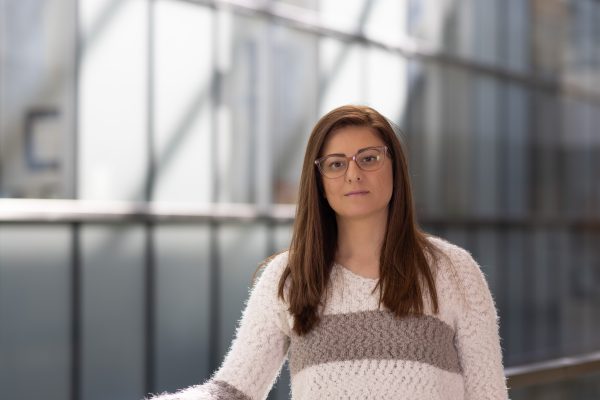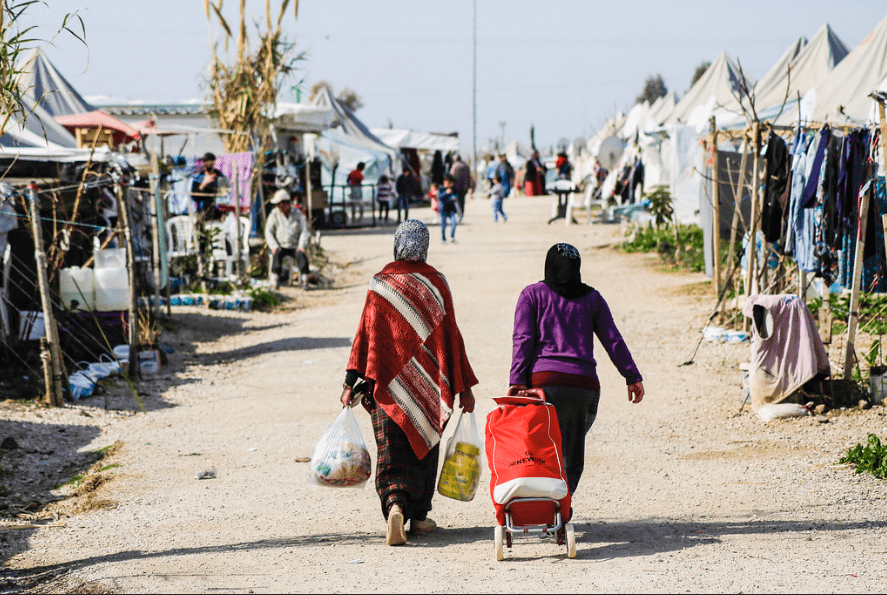Counseling Professor Dania Fakhro Brings Personal Experience to Refugee Mental Health

UNC Charlotte counseling professor Dania Fakhro remembers her neighbors in Syria wearing the keys to the homes they had been forced to flee around their necks. They were people displaced by conflict with roots common to the ongoing Israel-Hamas war that today leaves buildings in rubble and thousands dead. Born and raised in Syria, Fakhro witnessed refugees from the region arrive in her home country in droves seeking safety as gunshots and explosions echoed in the streets of their own many miles away. The keys they wore were symbols of loss and hope.
“Even then I asked myself ‘What is it like to be in a different place while keeping all the memories from your country at the same time you’re just trying to live and be active in your new society?’” she said. “It really affected me to hear the stories: people witnessing the torture of family members and many other traumas. It was so much at first. There was a part of me that wanted to be the helper. At the same time, I was as confused as they were.”
Fakhro had a talent for numbers growing up, and had pursued a career in economics working for a bank. Also a classically-trained violinist, she spent much of her free time playing as a member of the local orchestra. But when another conflict, the then-escalating Iraq War, sent refugees pouring into Syria in 2003, Fakhro was moved to respond. She began volunteering with nonprofits supporting people seeking shelter. What she saw and heard opened her eyes and a new path.
“Even with all the difficulties, I believed that my life was meaningful and I could help people, too.’ That’s why I’m still here– to do something with my life and make it meaningful for other people,” she said.
Fakhro’s commitment to volunteering to support refugees grew over time. Though she had no formal training, she used knowledge of her city and instincts to do what she could to help people navigate their new world and find the resources they needed.
Leaving Home
Armed conflict arrived on Fakhro’s doorstep in 2011 when years unrest in Syria cascaded into civil war as uprisings materialized across the Middle East in what came to be known as the Arab Spring.
“I became a refugee myself and I witnessed many of the things that I heard about. I lost close family members and friends. I remembered all the stories that I heard before. And I found it even more complicated than I had thought,” she said.
Fakhro was forced to search for a new home. With nowhere to go, she sought safety in countries across the world, struggling to find a place to settle and finally moving to the United States in 2015.
Fakhro’s experience is that of many worldwide. Globally, more than 110 million people have been forcibly displaced, according to the United Nations. Since the mid-1990’s, more than 18,000 refugees have resettled in the Charlotte region. The approval process for resettlement and refugee designation in the United States can take months or even years to complete.
Sadaf Alemi, a 26-year-old Charlottean and Afghan refugee said leaving her home was like a nightmare. She arrived in the United States from Kabul in 2021 fleeing the oppressive Taliban regime.
“When I left my country I felt lost, like when you had something but in a second you lost it can’t find it,” she said. “That feeling killed my inner peace. I wanted to be able to go to work and start from zero, but that’s the hardest part. There were a lot of challenges like the language barrier and culture. The way that I used to live was different from here, and taking care of yourself and family is not easy sometimes.”
Alemi now works with with Refugee Support Services as a Language & Community Access Coordinator.
Who is a Refugee?

Refugees are persons who are outside their country of origin for reasons of feared persecution, conflict, generalized violence, or other circumstances that have seriously disturbed public order and, as a result, require international protection.
Asylum seekers are individuals who are seeking international protection. In countries with individualized procedures, an asylum seeker is someone whose claim has not yet been finally decided on. Not every asylum seeker will ultimately be recognized as a refugee, but every recognized refugee is initially an asylum seeker.
While there is no formal legal definition of an international migrant, most experts agree that an international migrant is someone who changes his or her country of usual residence, irrespective of the reason for migration or legal status.
*According to the United Nations High Commission for Refugees
Finding New Paths
After arriving in the United States equipped with knowledge gained from her personal experiences and a blooming passion for helping others, Dania Fakhro graduated with a master’s degree in clinical mental health counseling from Rollins College 2020 and went on to earn a Ph.D. in counselor education and supervision from the University of Central Florida.
She moved to Charlotte in August to join the UNC Charlotte Department of Counseling and is seeking connections with individuals, non-profit organizations and providers across the city. Her arrival is welcome news for both refugees and providers.
“There are not a great deal of mental health service providers locally who are both trauma-informed and experienced in working cross-culturally or who come from within the different culture groups themselves. There is a huge unmet need for mental health support,” said Lindsay LaPlante, executive director of Refugee Support Services in Charlotte.
Addressing the mental health needs of refugees is a multifaceted issue that requires a comprehensive approach. It involves addressing the traumas of the past, acknowledging the stressors of migration, providing culturally competent mental health services, and working on social integration to create a supportive environment for the well-being of refugees.
Throughout her time working with refugees and counselors, Fakhro has observed a disconnect that often emerges from a combination of refugees’ high levels of complex trauma and their experiences with political oppression. She recalls hearing counselors label some refugees as “resistant” or “uncooperative” but says there is more to the story.
“In American culture, therapists will often ask their clients something like: “How do you feel”? Refugees can be suspicious of even this and it can be met with silence or superficial answers,” Fakhro said. “Where people are coming from, you might be killed for just saying your opinions. They want to know who you are as a counselor first. They want to know that you are not saying what they are saying to the government, and they won’t be persecuted.”
Barriers also include an unfamiliarity with mental health systems and resources, transportation, and language proficiency. And a recent study revealed providers only recommend 3% of refugees who participate in a mental health screening for treatment.
Rather than double down on therapy that isn’t connecting or simply concluding a person is unreachable, Fakhro encourages mental health professionals to focus on establishing trust. Creative approaches like expressive arts can provide a space for those with complex trauma to begin to understand their emotions in a manner that feels less threatening. Fakhro remembers inviting one client to play a song that described how she was feeling.
“She picked a song and was crying so much, but not saying a word. She was processing without even talking.”
Mental health professionals working with refugees must also find ways to consider both the unique perspective of individuals and the context in which their perspective was formed.
“Many people moving here come from a collective culture where you have to understand many layers to understand the person and you cannot just focus on the person themselves. You have to really expand what you are looking for so you can tailor your approach, Fakhro said. “At the same time, two refugees coming from the same place can come with extremely different experiences and emotions.”
Though real challenges face those who support the mental health needs of people seeking safety in the United States, Fakhro sees reason for optimism.
“Counselors can learn. There are strategies that work. I have seen it in action. We just have to approach what we do in a way that helps refugees feel safe enough to share,” she said.